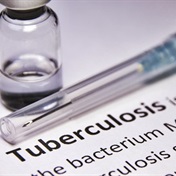Researchers reported in the New England Journal of Medicine on a new weapon against multi-drug-resistant tuberculosis.
Patients who received the experimental Otsuka drug delamanid for eight weeks, along with a standard regimen of other anti-TB medicines, were far more likely to see the bacteria disappear from their sputum compared to those who received the older medicines.
The lower dose of 100 mg twice daily worked as well, if not better, than a dose twice as high.
How the drug works
"We saw a 53% increase in sputum culture conversion and an accelerated time to conversion," coauthor Lawrence Geiter, a vice president at Otsuka, said. "So they convert much more quickly with delamanid and we saw what we think is a reasonable safety profile. This could be the first new class of TB compounds that would be licenced in nearly a half century."
The result is being called "significant but modest" in a Journal editorial by Drs Richard Chaisson and Eric Nuermberger of the Johns Hopkins University School of Medicine in Baltimore.
"We've been looking for new chemical classes of drugs for tuberculosis for a while," Dr Scott G.
Franzblau, director of the Institute for Tuberculosis Research at the University of Illinois at Chicago, who was not connected with the study, said. He said it's not surprising that a new drug would help against drug-resistant strains.
"That's kind of a given. Any new class of TB drug is expected to work against drug resistant strains because they haven't had a chance to become resistant to it. That's the easier part in making a dent in TB," he said. "The harder part is, can you really get a drug that will help you shorten treatment.
Effects of delemanid
The preclinical data obtained in mice suggested that this drug should be able to do that as well as others in its class, one of which is in clinical trial and the other is in a preclinical trial."
Otsuka designed, financed and wrote the study. All of the 481 TB patients from nine countries who participated received conventional treatment with a drug combination developed by the World Health Organization.
Of the 161 who also received 100 mg of delamanid twice daily, 45.4% had no trace of the TB bacterium in their lung fluid after two months. The rate was 29.6% among the 160 volunteers given a placebo (p=0.008). With a twice-daily dose of 200 mg, given to 160 people, the rate was 41.9% (p=0.04 compared to placebo.)
Headache, insomnia, and upper abdominal pain affected at least 20% of the patients getting delamanid. Nausea and vomiting were reported by 30% or more. But the rate wasn't significantly higher than among those receiving placebo.
Risk of a prolonged QT interval
A more serious concern was the risk of a prolonged QT interval. The researchers found that 13.1% of the patients getting the highest dose of the drug had a prolonged QT interval, compared to 9.9% with the lower dose (p=0.048) and 3.8% in the placebo group (p=0.005). However, none of the patients had any symptoms.
The problem occurs at the point "when the heart is repolarising and charging the battery to do the next beat," Dr Geiter said. "If the interval gets really long, much longer than we observed, it's not able to beat again in a functional matter so you start to get fibrillations or arrhythmia." "This is something we'll continue to look at," he said.
A longer study that will examine the effect of six months of treatment with delamanid, and follow those patients for 30 months, is underway.
(Reuters Health, Gene Emery, June 2012)
Read more:




 Publications
Publications
 Partners
Partners














